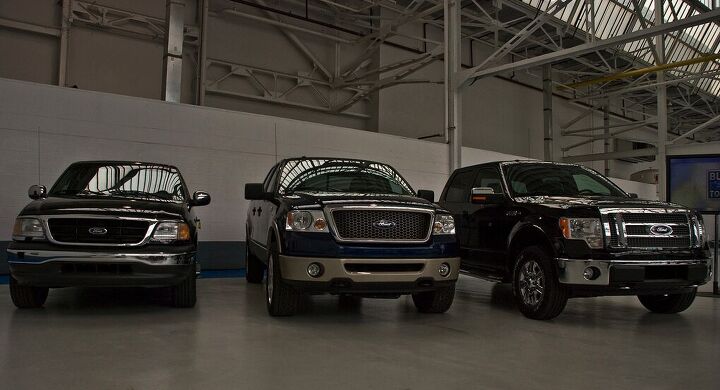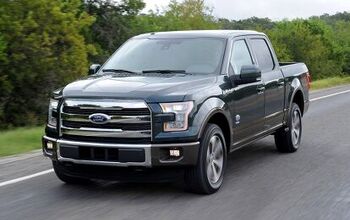The Full-Sized Future: Trucked By The High Cost Of CAFE?
Mass SUV consumption may have been weaned over to car-based Crossovers, but pickup trucks are still hugely popular and a major challenge for automakers facing steep increases in government CAFE standards.The average 2010-model American pickup truck weighs nearly 5,000 lbs, making it some 22 percent heavier than its equivalent ten years ago. Thanks to that weight gain, average pickup truck efficiency has improved by a paltry two percent since 2000. This year, the fleetwide light truck fuel economy standard was 24.9 MPG, but by 2016 light trucks will need to average about 30 MPG to comply with already-set CAFE increases, and could face another sharp increase by 2025. As a result, it seems that the era of cheap pickups may be coming to an end. Though the Detroit automakers say hybrid and plug-in drivetrains will help, it’s clear that more than anything else, trucks need to lose weight. That’s where things start getting expensive…
A Reuters report [via Automotive News] quote Ford and GM truck guys as saying they’re exploring some radical approaches to the pickup truck’s weight problem. After all, you don’t cut 500-1,000 lbs out of any vehicle without making some tough choices.
[full-size truck development boss Rick] Spina said GM aims to shed 500 pounds from its trucks by 2016, and by the early 2020s might need to cut as much as 1,000 pounds per truck.
Using blown-in foam instead of a cheaper, but heavier, pad to buffer noise in certain areas of the vehicle could become more commonplace, Spina said.
Meanwhile, Ford is looking closely at a magnesium alloy frame for the next generation of its F-150 pick-up truck, two people familiar with the matter said. Ford is also looking to use aluminum for the body panels of the F-150, they said.
By moving away from traditional steel, Ford could shave about 800 pounds off the truck, one person said. The comments were made privately because the information is not yet public.
Ford declined to comment on its specific product plans.
GM is also exploring the use of aluminum and magnesium for the frames of future models of its Chevrolet Silverado and GMC Sierra trucks, Spina told Reuters.
The obvious result of this kind of radical attempt to drag pickups into the modern era: prohibitive costs, of course. Pickups have long been (and yes, continue to be) a crucial (if not the crucial) profit center for Detroit’s automakers, commanding high prices for relatively low development costs. With the coming CAFE hikes, necessary adaptations like hybrid and plug-in drivetrains as well as these exotic alloy-based frames are going to vastly increase both the development and production costs of large pickups, essentially ending a decades-long love affair between American consumers and their big trucks.
Reuters didn’t get a quote on the costs and effectiveness of the kind of mass reduction that’s being envisioned, but a look at the National Research Council’s data on the subject shows that, for a V8 powered truck, a 20 percent mass reduction (cutting 1k lbs from a 5k lb truck), will result in an average 12 percent improvement in fuel economy, at a cost of $2,625 per vehicle. Now, that’s a very rough estimate, but by the NRC’s calculations, a 20 percent mass reduction is equivalent to about half the cost of converting to a clean diesel engine (which yields a 30 percent efficiency improvement). Add a 20 percent mass reduction to a clean diesel with an integrated starter-generator stop-start system (or a two-mode hybrid gas engine) and the incremental costs will be around $15k per vehicle compared to a modern V8-equipped pickup. If that doesn’t grab Truck Nation’s attention, nothing will.
The irony of all this is the fact that, just as Detroit starts looking at giving full-sized pickups a crash diet, the ranks of compact pickups are thinning as the American automakers allow the segment to wither on the vine. As full-sized and heavy-duty pickups become increasingly more expensive due to CAFE-necessary weight reductions and efficient drivetrains, it’s easy to see consumers flocking back to compact pickups, which will require fewer expensive technologies to reach CAFE compliance. But with classic nameplates like the Ranger (and less classic ones like the Colorado/Canyon) dying off after years of neglect due to cannibalism from cheap full-sized trucks, Detroit would apparently rather keep the trucks big and expensive than offer a cheaper, more practical alternative.
Eventually full-sized trucks, with their magnesium-alloy frames and advanced powertrains, will become a purely professional purchase, bought only by those who use them for work or by the wealthy (especially when gas prices eventually become more compelling than even CAFE standards). Hopefully, rather than putting all of their development money into desperately trying to keep full-sizers a favorite of the mass market, Detroit will eventually begin to offer a wider range of smaller pickups. It’s just too bad there’s no sign of this happening anytime soon.
More by Edward Niedermeyer
Latest Car Reviews
Read moreLatest Product Reviews
Read moreRecent Comments
- NotMyCircusNotMyMonkeys so many people here fellating musks fat sack, or hodling the baggies for TSLA. which are you?
- Kwik_Shift_Pro4X Canadians are able to win?
- Doc423 More over-priced, unreliable garbage from Mini Cooper/BMW.
- Tsarcasm Chevron Techron and Lubri-Moly Jectron are the only ones that have a lot of Polyether Amine (PEA) in them.
- Tassos OK Corey. I went and saw the photos again. Besides the fins, one thing I did not like on one of the models (I bet it was the 59) was the windshield, which looked bent (although I would bet its designer thought it was so cool at the time). Besides the too loud fins. The 58 was better.


































Comments
Join the conversation
So your tacoma uses more fuel than my 2wd V8 powered ram, and some other fullsize trucks. Maybe you tacoma owners should start the ball rolling by getting rid of your trucks first.
Here in the US, we think that bigger is better. Changing that perspective will take only a small change in human nature, or money shock, or government intervention. We don't seem to care about mileage until gasoline gets too high, then we panic, depressing the economy, so money shock doesn't appear to be an optimal solution. People still smoke tobacco, even knowing what it does to them, so I hold out no hope for human nature, either. Detroit puts in some pretty solid engineering to get their 5k pound trucks to achieve 20+ mpg. Think what kind of mileage they could get if they weighed what they did 10 years ago. Then we wouldn't have to send our petrodollars to people who don't like us, and who then send our money to people who really don't like us. Seems like a better way to starve out the last group is send them fewer petrodollars; it would work better than putting a "Proud to be an American" sticker on the bumper.